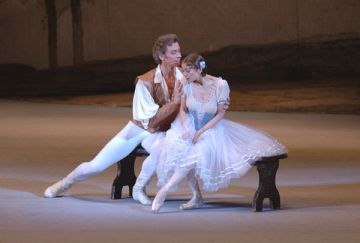New Stage
| 15 November |
| 14:00 |
| 2023 | Wednesday |
|
Adolphe Adam "Giselle" (Ballet in two acts Production by Yuri Grigorovich) Ballet |
|
| Artists |
Credits |
Théophile Gautie, Author libretto Vernoy de Saint-Georges, Author libretto
|
World premiere: 28 Jun 1841 Paris, France
Libretto by Theophile Gautier and Jean-Henry Saint-Georges Presented with one interval.
Additional informationCharacters and performers
Giselle (French: Giselle ou les Wilis) is a ballet in two acts with a libretto by Jules-Henri Vernoy de Saint-Georges and Théophile Gautier, music by Adolphe Adam, and choreography by Jean Coralli and Jules Perrot. The librettist took his inspiration from a poem by Heinrich Heine. The ballet tells the story of a peasant girl named Giselle whose ghost, after her premature death, protects her lover from the vengeance of a group of evil female spirits called Wilis (a type of Slavic fairy also spelled Vila, Wila, Wiła, Veela). Giselle was first presented by the Ballet du Théâtre de l'Académie Royale de Musique at the Salle Le Peletier in Paris, France, on 28 June 1841. The choreography in modern productions generally derives from the revivals of Marius Petipa for the Imperial Russian Ballet (1884, 1899, 1903). SynopsisAct I
A small, peaceful village, bathed in sunlight. It is inhabited by simple, artless people. Giselle, a young peasant girl, is rejoicing in the sun, the blue sky, the singing of the birds and, most of all, in the happiness of pure, trusting love which has lit up her life. She is in love and is confident that she is loved. The gamekeeper, who is in love with Giselle, tries in vain to persuade her that Albrecht, her loved one, is not a peasant at all but a nobleman in disguise and that he is deceiving her.
The gamekeeper manages to steal into the cottage which Albrecht is renting in the village and here he finds a silver sword with a coat of arms on it. Now the gamekeeper knows for sure that Albrecht is concealing his noble origins.
A party of distinguished noblemen, attended by a sumptuous suite, seek rest and refreshment in the village after the hunt. The peasants give their guests a cordial welcome.
Albrecht is embarrassed by this unexpected meeting: he tries to hide the fact he knows them for, in their company, is his betrothed, Bathilde. Meanwhile the gamekeeper shows everyone Albrecht’s sword and, unmasking him, tells them of the latter’s deceit. Giselle is shocked to the core by the perfidy of her loved one. The pure, crystal-clear world of her faith, hopes and dreams has been destroyed. She goes mad and dies.
Act II
Night-time. The ghostly forms of the Wilis, died brides, appear among the graves of the village church yard which is bathed in moonlight. “Dressed in bridal gowns and garlands of flowers...The irresistibly beautiful Wilis danced to the light of the moon. And as they felt the time given them for dancing was running out and that they had again to return to their icy graves, their dancing became more and more impassioned and rapid...” (Heinrich Heine).
The Wilis catch sight of the gamekeeper who, suffering from pangs of conscience, has come to visit Giselle’s grave. At the command of Myrtha, the unrelenting Queen of the Wilis, the Wilis encircle the gamekeeper and make him dance until he drops lifeless, to the ground.
Albrecht too, is unable to forget Giselle. And, at dead of night, he comes to her grave. The Wilis immediately encircle the youth. Albrecht is now threatened by the same horrifying fate as the gamekeeper. But the shadow of Giselle now appears and her eternal and self-sacrificing love protects and saves Albrecht from the anger of the Wilis.
The ghostly, white forms of the Wilis vanish with the first rays of the rising sun. And Giselle’s ethereal shadow vanishes too, but Giselle will always be alive in Albrecht’s memory — the ever-present regret for a lost love, a love that is stronger than death. © wikipedia
© Bolshoi Theatre Libretto
|
|
Main Stage
1 Teatralnaya ploschad (1 Theatre Square), Moscow, Russia
New Stage
Bol'shaya Dmitrovka Street, 4/2, Moscow, Russia
|


